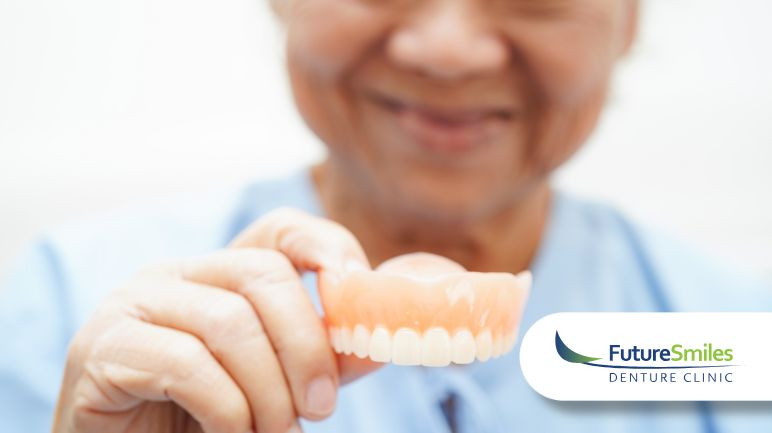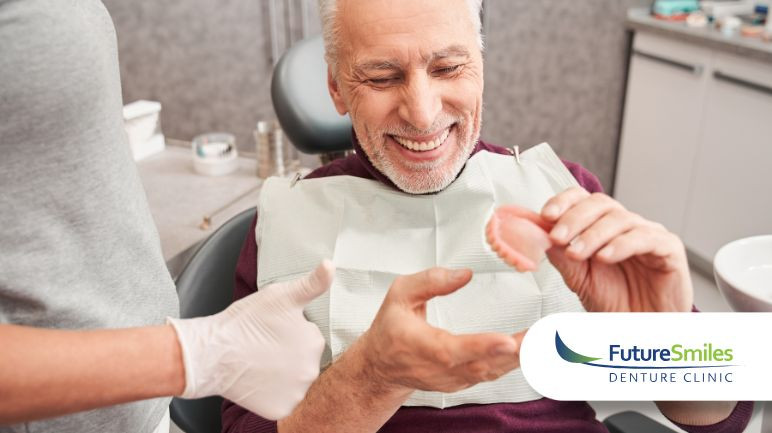Dental implants are a permanent replacement option for missing teeth and dentures. They work by implanting a structure beneath the gum that holds a post outside of the gum for the replacement teeth to attach to. Depending on the density and strength of your jaw bone, there are different types of implants to best suit you. These dental implants are endosteal, subperiosteal, and zygomatic. All of which are implanted using the same general theory but with slight differences to accommodate your jawbone health. In this article, we highlight which type of implant may work best for you. As always remember to talk to your Denturist for a thorough review and recommendation.
The Dental Implant You Receive Depends On Your Jawbone
If you are missing teeth and are tired of wearing dentures, dental implants are a viable option for you. Patients requiring dental implants may have differing jawbone strength and density which will determine the type of dental implant they receive. This makes dental implants available to a wide patient base so more people can have permanently replaced teeth.
Three Dental Implant Options:
Endosteal
Endosteal implants are the most common type of dental implant. They involve a placeholder post that is put into the jaw bone like a screw. After the placeholder post is inserted into the jaw, it is given time to heal and becomes a part of the jaw and gums. Once the gums are fully healed, an artificial tooth will then be placed onto the post and fill the spot of the missing tooth. While this is the most common type of dental implant, since the method involves attaching the post to the jaw bone, patients must have a strong and fully grown jaw with enough bone for the post to be held in the jawbone.
Subperiosteal
Subperiosteal implants are the primary alternative to endosteal implants. The only difference between endosteal and subperiosteal implants is that subperiosteal implants use a metal frame that gets placed on top of the jaw rather than inserting a post into the bone. The metal frame holds a post that remains outside of the gum line and is used to attach the replacement tooth after the gum has been healed. As endosteal implants are the initial choice for implants, subperiosteal implants are only used when the patient does not have enough jaw bone for an implant to be inserted.
Zygomatic
Zygomatic implants are the least common type of implant and are only used when the patient’s jaw bone has deteriorated to the point that it cannot hold an implant post nor a metal frame. Zygomatic implants are made in a similar fashion to endosteal implants but use a different placeholder and post to reach and be implanted into the cheekbone rather than the jaw.
Seek Professional Advice To Find The Right Implant For You
Chances are if you have strong oral health and a healthy jaw bone, endosteal implants may be the best option for you. If you have a sufficient jaw bone but not enough to implant a post into, subperiosteal may be recommended. If your jaw bone is not dense enough to hold any type of implant, there is still the zygomatic implant alternative.
Understanding what dental implant is right for you is best determined by a professional. Book a consultation with our Denturists at Future Smiles to learn more about what dental implants are right for you.
FAQs
Are dental implants common?
Due to the prevalence of tooth loss, dental implants are a common practice. Dental implants are a common solution to tooth replacement as they have the ability to replace one or several missing or decaying teeth and can offer permanent, aesthetically pleasing results.
Are dental implants safe?
Dental implants are one of the most reliable ways to replace missing teeth. They have been used by dentists for many years and are proven to be safe and reliable.
What is the downside to dental implants?
As receiving a dental implant is an oral surgical procedure, it comes with risks associated with that. This includes the potential of infection, pain, and inflammation. However, negative effects are rare and can be prevented with proper aftercare






